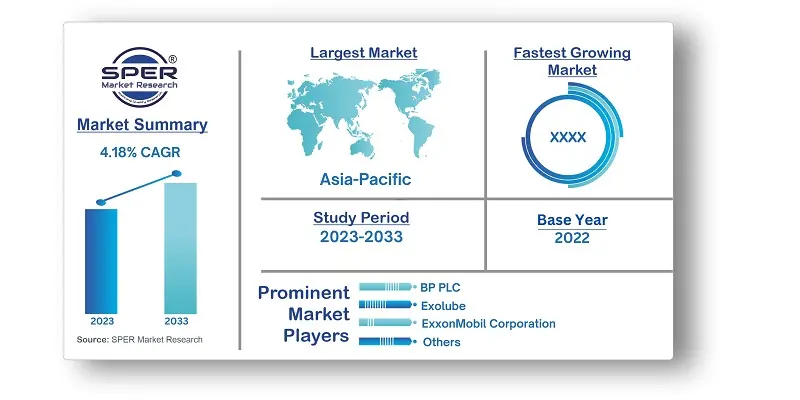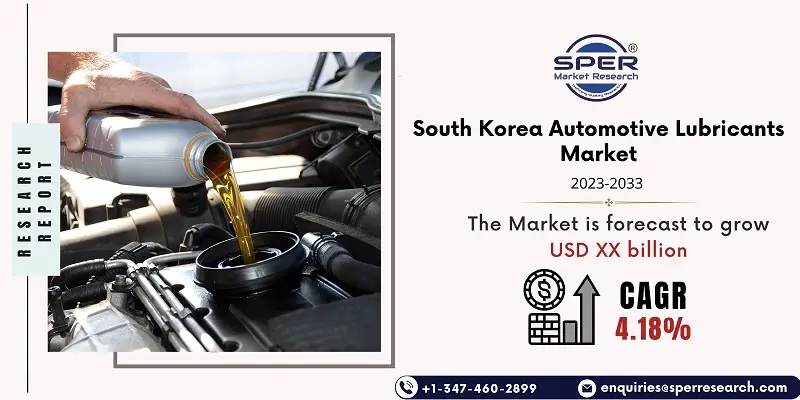
South Korea Automotive Lubricants Market Growth, Size, Trends, Share and Future Competition
South Korea Automotive Lubricants Market Size- By Vehicle Type, By Product Type- Regional Outlook, Competitive Strategies and Segment Forecast to 2033
| Published: Feb-2024 | Report ID: CHEM2425 | Pages: 1 - 102 | Formats*: |
| Category : Chemical & Materials | |||
- January 2022: ExxonMobil Upstream Company, ExxonMobil Product Solutions, and ExxonMobil Low Carbon Solutions were the three business lines that comprised the organization of ExxonMobil Corporation as of April 1.
- In August 2021, 439 Renault Samsung Motors after-sales service (AS) outlets nationwide will sell Castrol synthetic engine oil, which is specially made for Renault engines and is available at a discounted price.


| Report Metric | Details |
| Market size available for years | 2020-2033 |
| Base year considered | 2023 |
| Forecast period | 2024-2033 |
| Segments covered | By Vehicle Type, By Product Type |
| Regions covered | Southern Region, Northern Region, Eastern Region, Western Region |
| Companies Covered | BP PLC, Exolube, ExxonMobil Corporation, FUCHS, GS Caltex, Hyundai Oilbank, Motul, Ravensberger Schmierstoffvertrieb GmbH, Royal Dutch Shell Plc, SK Lubricants Co. Ltd, Others |
- Manufacturers and Suppliers
- Automotive Industry
- Aftermarket Service Providers
- Distributors and Retailers
- Research and Development Professionals
- Regulatory Authorities
- Investors and Financial Institutions
- Environmental and Sustainability Organizations
- Government Agencies
| By Vehicle Type: |
|
| By Product Type: |
|
| By Region: |
|
- South Korea Automotive Lubricants Market Size (FY’2024-FY’2033)
- Overview of South Korea Automotive Lubricants Market
- Segmentation of South Korea Automotive Lubricants Market By Vehicle Type (Commercial Vehicles, Motorcycles, Passenger Vehicles)
- Segmentation of South Korea Automotive Lubricants Market By Product Type (Engine Oils, Greases, Hydraulic Fluids, Transmission & Gear Oils)
- Segmentation of South Korea Automotive Lubricants Market By Type (Lysine,
- Expansion Analysis of South Korea Automotive Lubricants Market
- Problems and Obstacles in South Korea Automotive Lubricants Market
- Competitive Landscape in the South Korea Automotive Lubricants Market
- Impact of COVID-19 and Demonetization on South Korea Automotive Lubricants Market
- Details on Current Investment in South Korea Automotive Lubricants Market
- Competitive Analysis of South Korea Automotive Lubricants Market
- Prominent Players in the South Korea Automotive Lubricants Market
- SWOT Analysis of South Korea Automotive Lubricants Market
- South Korea Automotive Lubricants Market Future Outlook and Projections (FY’2024-FY’2033)
- Recommendations from Analyst
1.1. Scope of the report1.2. Market segment analysis
2.1. Research data source2.1.1. Secondary Data2.1.2. Primary Data2.1.3. SPER’s internal database2.1.4. Premium insight from KOL’s2.2. Market size estimation2.2.1. Top-down and Bottom-up approach2.3. Data triangulation
4.1. Driver, Restraint, Opportunity and Challenges analysis4.1.1. Drivers4.1.2. Restraints4.1.3. Opportunities4.1.4. Challenges4.2. COVID-19 Impacts of the South Korea Automotive Lubricants Market
5.1. SWOT Analysis5.1.1. Strengths5.1.2. Weaknesses5.1.3. Opportunities5.1.4. Threats5.2. PESTEL Analysis5.2.1. Political Landscape5.2.2. Economic Landscape5.2.3. Social Landscape5.2.4. Technological Landscape5.2.5. Environmental Landscape5.2.6. Legal Landscape5.3. PORTER’s Five Forces5.3.1. Bargaining power of suppliers5.3.2. Bargaining power of buyers5.3.3. Threat of Substitute5.3.4. Threat of new entrant5.3.5. Competitive rivalry5.4. Heat Map Analysis
6.1. South Korea Automotive Lubricants Market Manufacturing Base Distribution, Sales Area, Product Type6.2. Mergers & Acquisitions, Partnerships, Product Launch, and Collaboration in South Korea Automotive Lubricants Market
7.1. South Korea Automotive Lubricants Market Value Share and Forecast, By Vehicle Type, 2024-20337.2. Commercial Vehicles7.3. Motorcycles7.4. Passenger Vehicles
8.1. South Korea Automotive Lubricants Market Value Share and Forecast, By Product Type, 2024-20338.2. Engine Oils8.3. Greases8.4. Hydraulic Fluids8.5. Transmission & Gear Oils
9.1. South Korea Automotive Lubricants Market Size and Market Share
10.1. South Korea Automotive Lubricants Market Size and Market Share By Vehicle Type (2020-2026)10.2. South Korea Automotive Lubricants Market Size and Market Share By Vehicle Type (2027-2033)
11.1. South Korea Automotive Lubricants Market Size and Market Share By Product Type (2020-2026)11.2. South Korea Automotive Lubricants Market Size and Market Share By Product Type (2027-2033)
12.1. South Korea Automotive Lubricants Market Size and Market Share By Region (2020-2026)12.2. South Korea Automotive Lubricants Market Size and Market Share By Region (2027-2033)12.3. Eastern12.4. Western Region12.5. Northern12.6. Southern
13.1. BP PLC13.1.1. Company details13.1.2. Financial outlook13.1.3. Product summary13.1.4. Recent developments13.2. Exolube13.2.1. Company details13.2.2. Financial outlook13.2.3. Product summary13.2.4. Recent developments13.3. ExxonMobil Corporation13.3.1. Company details13.3.2. Financial outlook13.3.3. Product summary13.3.4. Recent developments13.4. FUCHS13.4.1. Company details13.4.2. Financial outlook13.4.3. Product summary13.4.4. Recent developments13.5. GS Caltex13.5.1. Company details13.5.2. Financial outlook13.5.3. Product summary13.5.4. Recent developments13.6. Hyundai Oilbank13.6.1. Company details13.6.2. Financial outlook13.6.3. Product summary13.6.4. Recent developments13.7. Motul13.7.1. Company details13.7.2. Financial outlook13.7.3. Product summary13.7.4. Recent developments13.8. Ravensberger Schmierstoffvertrieb GmbH13.8.1. Company details13.8.2. Financial outlook13.8.3. Product summary13.8.4. Recent developments13.9. Royal Dutch Shell Plc13.9.1. Company details13.9.2. Financial outlook13.9.3. Product summary13.9.4. Recent developments13.10. SK Lubricants Co. Ltd13.10.1. Company details13.10.2. Financial outlook13.10.3. Product summary13.10.4. Recent developments13.11. Others
SPER Market Research’s methodology uses great emphasis on primary research to ensure that the market intelligence insights are up to date, reliable and accurate. Primary interviews are done with players involved in each phase of a supply chain to analyze the market forecasting. The secondary research method is used to help you fully understand how the future markets and the spending patterns look likes.
The report is based on in-depth qualitative and quantitative analysis of the Product Market. The quantitative analysis involves the application of various projection and sampling techniques. The qualitative analysis involves primary interviews, surveys, and vendor briefings. The data gathered as a result of these processes are validated through experts opinion. Our research methodology entails an ideal mixture of primary and secondary initiatives.



Frequently Asked Questions About This Report
PLACE AN ORDER
Year End Discount
Sample Report
Pre-Purchase Inquiry
NEED CUSTOMIZATION?
Request CustomizationCALL OR EMAIL US
100% Secure Payment






Related Reports
Our Global Clients
Our data-driven insights have influenced the strategy of 200+ reputed companies across the globe.




















